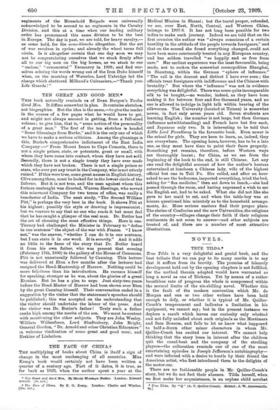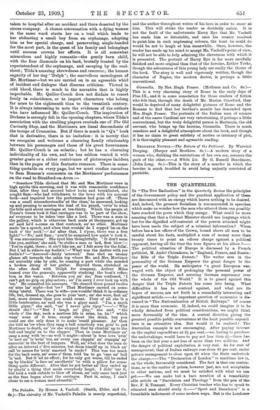NOVELS.
TRUE TILDA.*
True Tilda is a very delightful and genial book, and the best tribute that we can pay to its many merits is to say that it suffers from its brevity. The promise of leisurely development held out by the opening chapters is not fulfilled, for the method therein adopted would have warranted as long a novel as one of Dickens. Yet by means of a rather breathless rate of progress the whole is compressed within the normal limits of the six-shilling novel. Whether this is the fault of the modern convention which Mr. de Morgan and one or two other writers have been bold enough to defy, or whether it is typical of Mr. Quiller- Couch's temperament and indicates a limitation in his equipment, we cannot say; but in the present instance we deplore a result which leaves our curiosity only whetted and not fully satisfied about such originals as the Mortimers and Sam Bossom, and fails to let us know what happened -to half-a-dozen other minor characters in whom Mr. garner-Couch has excited our interest. We cannot help thinking that the story loses in interest after the children quit 'the canal-boat and the company of the strolling players—the collocation reminds one of one of the most entertaining episodes in Joseph Jefferson's autobiography— and were infected with a desire to hustle by their friend the American artist, who'first introduced them to the delights of the motor-car.
'There are no faihionable people in Mr. Quiller-Conch's story, but we do not feel their absence. Tilda herself, when we first make her acquaintance, is an orphan child acrobat
• True Telda. By "a" (A. T. Quiller•Conch). Briatol: J. W. Arrowsmith. 611.]
taken to hospital after an. accident and there deserted by the circus company. A chance conversation with a dying woman in the same ward starts her on a trail which leads to her abducting a small boy from an orphanage, adopting him as her special charge; and: persevering; single-handed for the most part, in the quest of his family and belongings until success crowns her efforts. It is all somewhat miraculous and highly romantic—the gently born child, with the four diamonds on his back, brutally treated by' the superintendent of the orphanage, and escaping by. the coal- shoot ; Tildes amazing shrewdness and resource ; the human sagacity of her dog "Dolph ' ; the marvellous monologues of Mr. Mortimer—but we are carried on in an agreeable whirl of incident and dialogue that disarms criticism. Viewed in cold blood, there is much in the narrative that is highly improbable. Mr. Quiller-Couch does not disdain to resort freely to coincidence, or to import characters who belong far more to the eighteenth than to the twentieth century. It is always interesting to note the evidences of the authors who have influenced Mr. Quiller-Couch. The inspiration of Dickens is strongly felt in the opening chapters, where Tilda.'s association with the strolling players reminds one of The Old Curiosity Slop, and the Mortimers are lineal descendants of the troupe of Crummles. But if there is much in " Q's " hook that is derivative, there is no imitation : it is merely that we recognise and welcome a charming family relationship between his personages and those of his great forerunners. Mr. Quiller-Couch is an eclectic ; but he has a charming individuality of_ his own, and he has seldom vented it with greater gusto or a richer contrivance of picturesque incident
than in the pages of this fantastic romance. There is some- thing quotable on every page, but we must confine ourselves to Sam Bossom's comments on the Mortimers' performance on the road to Stratford-on-Avon :--
" Somehow Tilde divined that Mr. and. Mrs. Mortimer were in high spirits this morning, and it was with reasonable confidence that, after they had moored below locks and, breakfasted, she sought Sam—who had withdrawn to the bows with his account book—and inquired how the performance had gone off. There was a small misunderstandin' at the close,' he answered, looking up and pausing to moisten the lead of his pencil, ‘owin' to what the bills said about carriages at ten-thirty. Which the people at Tizzer's Green took it that carriages was to be part of the show, an' everyone to be taken 'ome like a lord. There was a man in the gallery, which is otherwise back seats at threppence, got up an' said he'd a-come on that contrack, an' no other. Mortimer made 'im a speech, and when that wouldn' do I copped 'urn on the back o' the neck.'—' Aie after that, I s'pose, there was a free fight ?'—'No,! said Sam ; you'd be surprised how quiet 'e took it. 'E was unconscious.' She eyed him thoughtfully. It don't seem like you, neither,' she, said, `to strike a man so 'aid, first blow!— ' You're right, there ; it ain't like me, an' I felt sorry for the feller.. But I 'ad to relieve my feelin's.'—' What was the matter with yer feelin's ? 'Arrowed—fairly 'arrowed: Sam shot an uneasy glance aft towards the cabin top where Mr. and Mrs. Mortimer sat amicably side by side, he conning a part while she mended a broken string of her guitar. Beyond them, stretched on the after deck with 'Dolph for company, Arthur Miles leaned over the- gunwale, apparently studying the boat's reflec- tion in the. water. Between you an' me,' Sam confessed, I can't get no grip on play-actors ; an' I'm sorry. I ever took up with 'em.' He consulted his accounts. 'He cleared three pound twelve an' nine Ins' night—but 'ow? That Mortimer- carried on some- thing 'ateful. There was 'is wife—you wouldnf think it in ordinary life, but, dressed up, she goes to your 'cart ;, an she wore, first an' last, more dresses than you. could. count. First of all she 'it a little tambourine, an' said she was a gipsy maid. "I'm a march little gipsy," she said, "an' I never gets tipsy"—'—' Why should she?'—' "But I laugh an' play," she said, "the whole o' the day, such a. nartless life is mine, ha, ha !" which wean' none of it true, except about the drink, but you could see she only done it to make 'exaelf, pleasant. An' then she told us 'ow when they rang a bell somebody was goin' to put Mortimer to death, an' ow she stopped that by. climbin' up to the bell and 'engin' on to the clapper. Then in came Mortimer an' sang a song with 'er—as well 'e might—about 'is true love 'avin' 'is 'eart an' is 'avin"ers, an' every one clappin' an' stampin' an' ancorein' in the best of tempers. Well,, an' what does the man do after an interval o' five minutes, but dress hisself up in black an' call 'er names for 'avin' married 'is uncle?' This was too much for the back seats, an' some o' them told 'ha to go 'ome an' boil 'is 'cad. But it 'ad. no effect; for he only got worse, till he ended up by blackin"is face an' smotherin"er with a pillow for some- thing quite different. After that he got better an' they ended up by playin' a, thing that made everybody laugh. I didn"ear it, but took a walk outside to blow off steam, an only came back just as the fuss began about the carriages. Fact is, missy, I can't abear to see a woman used abuseful."











































 Previous page
Previous page